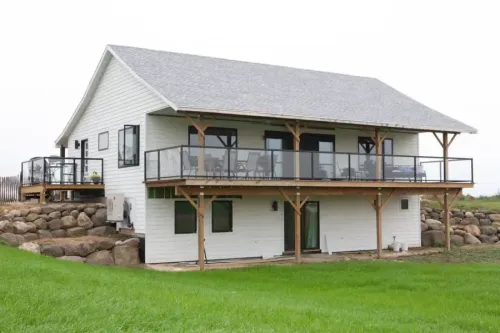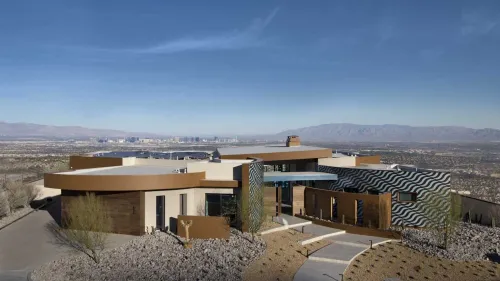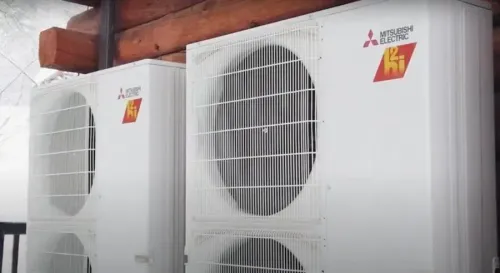Project Location: Victor, Idaho
Completion Date: December 2018
Challenge
Building a development of high-performance, energy-efficient homes that can withstand cold wintersSolution
Mitsubishi Electric Zoned Comfort Solutions®Result
Six net-zero ready homes that use high-performing heat pumps and zoning to minimize utility costs
By December 2018, when the project team behind Cloverleaf Court hosted the development’s first open house, the project had been several years in the making. Finally, developer John Love’s vision for a neighborhood consisting of six energy-efficient, high-performance houses was a reality.
“We wanted to take this project and use it as a model for what truly matters in a high-performance home: what’s behind the walls, the kind of heating system, the energy-efficiency and the long-term durability,” said Brady Barkdull, builder and owner of Wydaho Construction.
To bring the project to life, Barkdull teamed up with architects Lindsey Love and Lindsay Schack, owners of Love Schack Architecture and Jeff Deutschendorf, the project’s HVAC installer/contractor and owner of Fox Creek Heating Llc. Sharing common goals of efficiency, comfort and performance, the team set out to complete the development.
To fulfill these goals, the project team required a high-performing HVAC system that could handle the cold winters of Victor, Idaho, where Cloverleaf Court was built. This was no easy feat. The typical January day in Victor has temperatures below freezing and an average of 110 inches of snow falls on the city each year. Fortunately, Deutschendorf offered the answer: Mitsubishi Electric Zoned Comfort Solutions®. “If you’re going to have an energy-efficient home, the Mitsubishi Electric product is really the only way to go,” said Deutschendorf.
A Cold Climate Solution
Love and Schack, whose main focus is to build homes that can withstand cold climates, agreed. “We love designing in the Rocky Mountain West. What we get excited about is when we can design beautiful spaces that are also highly efficient from a performance standpoint,” said Schack. “We strive to offer energy efficiency and cost-effectiveness so our clients have a beautiful home they can be comfortable in no matter what the weather is outside.”
With a limited window of warm weather to build in, the project saw a quick turnaround. The team broke ground in May 2018 and completed the necessary infrastructure (including water, sewer and power) before beginning to build the homes a month later.
Idaho’s cold winters proved to be a challenge for more than the construction timeframe, however. The team was hard-pressed to find an HVAC system that could perform in the coldest conditions as well as find an HVAC contractor that could guarantee tightly-sealed installation.
That’s when Fox Creek Heating, Llc entered the picture.
“Being in a cold climate, it’s a little challenging to use high-performance mini-splits. There weren’t a lot of HVAC contractors who were willing to get certified on the systems,” said Lindsey Love. “Once we found out that Fox Creek Heating was willing to do that for this project and to use this Mitsubishi Electric system, and we compared the costs, that was the lynchpin that made us choose this system.”
The Cloverleaf Court homes utilize SUZ model outdoor units from Mitsubishi Electric, which offer an 18,000 BTU/h maximum rated capacity and are equipped with an INVERTER-driven compressor to restrict energy use to the precise amount needed to condition a zone. While conventional systems with fixed-speed compressors use the same amount of energy regardless of the load, the SUZ units (applied with SVZ multi-position air handlers) vary capacity to meet part-load conditions. The INVERTER technology, along with high-performance grooved piping to increase the heat-exchange area, delivers cost-savings for homeowners even in cold climates.
“The systems used in the Cloverleaf Court homes perform reliably in cold climates, and I’ve seen them operate at very low temperatures. For auxiliary heat, we applied an 8 kW heat strip to the SVZ air handlers, but we let the system run on the heat pumps as long as possible,” said Deutschendorf. “In this project, kumo cloud® from Mitsubishi Electric manages changeover. kumo cloud uses various algorithms to determine when auxiliary heat should start up. In the ‘comfort setting’ mode, the heat strip kicks on early enough to maintain temperature. In the ‘economy setting’ mode, the system relies solely on the heat pump’s capabilities for as long as possible.”
Upfront Costs To Cost Savings
A common challenge with energy-efficient building is cost. High-performance equipment and building materials tend to have higher upfront costs than their more conventional counterparts. Estimated price tags for the development’s approximately 1,150-1,500-square-foot homes could be up to 10 percent higher than traditional homes of the same size.
Those up-front costs are offset, however, by energy and maintenance savings.
An energy audit determined that a Cloverleaf Court homeowner could expect to pay about $1,100 per year in power bills. That number includes a monthly $35 line and systems maintenance fee set by the utility company. Without that fee, the homeowner would pay approximately $680 per year, or less than $60 per month, for power used. That cost would drop even more if the homeowner opted to install solar panels.
“We involved an energy rater, Brian Bennett, in the building process who provided all of the design-to-criteria,” said Deutschendorf. “In the beginning, we weren’t sure if these houses would be net-zero ready, but once we had data back from the energy audit we were able to clearly set our objectives. From there, we handled the design for the project in-house.”
Environmental Consideration
“One of the goals was to reach a Net-Zero Energy Ready certification as well as an Energy Star® certification, and in order to do that you’ve got to have a state-of-the-art, energy-efficient heating system,” said Barkdull. “That’s where the Mitsubishi Electric Zoned Comfort Solutions came in.”
With an eco-minded team behind it, the development was destined to be green from the start. A preliminary energy audit was conducted on the plan before any of the homes were constructed. Once the project team was satisfied with the plan expectations, construction on all six of the homes began at once.
This method was cost-effective and efficient and led to minimal environmental impact by coordinating infrastructure improvements such as excavation, concrete pouring and waste hauling. Building materials were sourced from nearby areas to minimize the project’s carbon footprint and a conscious effort was made to divert debris from landfills whenever possible.
The Cloverleaf Court homes themselves are also eco-friendly. They were thoughtfully designed to be net-zero ready, meaning that with the installation of solar panels (or another renewable energy system) the home can offset most if not all of its energy consumption.
“These homes are certified net-zero ready, and the certificates are completed on several of them already,” said Deutschendorf. “The homes are ready for solar panels if the buyer decides to install, at which point they would be 100 percent net-zero.”
The architects decided against installing solar panels themselves so that homeowners could enjoy tax deductions and utility rebates that come with both installing and using solar energy.
The Role Of Zoned Comfort Solutions
“Our mission at Wydaho Construction is to build high-performance, energy efficient, healthy homes. We like to focus on projects that are not only interesting aesthetically, but more importantly, how the home functions, what makes it run, what impacts your energy bill and what is going to make the occupants comfortable and healthy,” said Barkdull.
The use of Mitsubishi Electric Zoned Comfort Solutions satisfied all of Barkdull’s goals for the high-performance development. Units installed throughout the homes are individually controlled, resulting in less wasted energy to condition rooms that aren’t in use.
“There is nothing else on the market that performs as well,” said Deutschendorf. “It saves homeowners money on utility bills and they feel like they’re doing something for the environment. The performance is better, more comfortable and quieter. That goes a long way with our customers.”
Although every project and individual homeowner will have unique goals and constraints, energy efficiency remains top-of-mind for many. Barkdull recognizes an inherent drive in his customers to contribute to a better environment and anticipates more requests for energy-efficient homes in the Victor area.
Project Team
- Developer: John Love
- Builder: Wydaho Construction, Victor, Idaho
- Architect: Love Schack Architecture, Victor, Idaho
- Energy Rater: Brian Bennett
- HVAC Installer/Contractor: Fox Creek Heating Llc, Victor, Idaho
Mitsubishi Electric Equipment Installed
- (1) SVZ Multi-Position Air Handler
- (1) SUZ Universal Outdoor Unit
- (1) PAC kumo cloud® Wireless Interface









